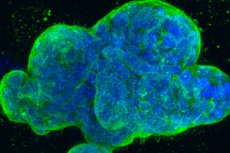Nye publikasjoner
Forskere har identifisert en ny markør for brystkreftprognose
Sist anmeldt: 02.07.2025

Alt iLive-innhold blir gjennomgått med medisin eller faktisk kontrollert for å sikre så mye faktuell nøyaktighet som mulig.
Vi har strenge retningslinjer for innkjøp og kun kobling til anerkjente medieområder, akademiske forskningsinstitusjoner og, når det er mulig, medisinsk peer-evaluerte studier. Merk at tallene i parenteser ([1], [2], etc.) er klikkbare koblinger til disse studiene.
Hvis du føler at noe av innholdet vårt er unøyaktig, utdatert eller ellers tvilsomt, velg det og trykk Ctrl + Enter.

Et protein kalt RPGRIP1L (retinitis pigmentosa GTPase-regulatory interacting protein 1-like) har en rekke funksjoner som er viktige for utvikling og helse gjennom hele livet. Mutasjoner i RPGRIP1L-genet er assosiert med en rekke sykdommer.
En ny studie publisert i The FASEB Journal antyder at RPGRIP1L-genuttrykksnivåer kan tjene som en ny prognostisk markør for pasienter med invasiv brystkreft.
Da forskerne undersøkte brystvevsprøver fra forskjellige kvinner, fant de at RPGRIP1L-ekspresjon var forhøyet i invasive brystkreftprøver sammenlignet med normalt brystvev. I tillegg hadde de med høy RPGRIP1L-genekspresjon kortere overlevelsestid blant pasienter med invasiv brystkreft sammenlignet med de med lave ekspresjonsnivåer. Dessuten var forhøyet RPGRIP1L-ekspresjon korrelert med en rekke ugunstige klinisk-patologiske trekk, som forekomst av mer aggressive kreftformer og større svulster.
Forskerne identifiserte også 50 gener og 15 proteiner hvis uttrykk var positivt korrelert med RPGRIP1L-uttrykk. De fleste av disse proteinene og genene var involvert i ulike aspekter av immunresponsen og metabolismen.
Til slutt fant teamet at fire forbindelser brukt mot kreft – abrin, epigallocatechin gallat, gentamicin og tretinoin – viste potensial til å redusere RPGRIP1L-ekspresjon i laboratorieforsøk.
«Resultatene fra studien vår fremhever potensialet til RPGRIP1L som en betydelig prognostisk biomarkør for brystkreft og antyder levedyktigheten til nye terapeutiske strategier som kan modifisere sykdomsforløpet, og dermed potensielt forbedre overlevelsesraten blant berørte pasienter», sa medforfatter Jie Zeng, PhD, ved First Affiliated Hospital of Hunan Normal University i Kina.
